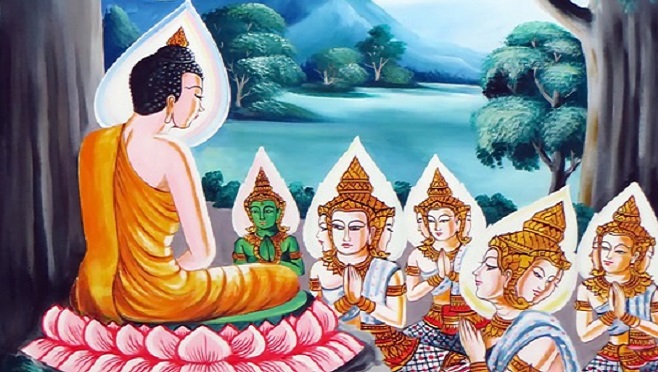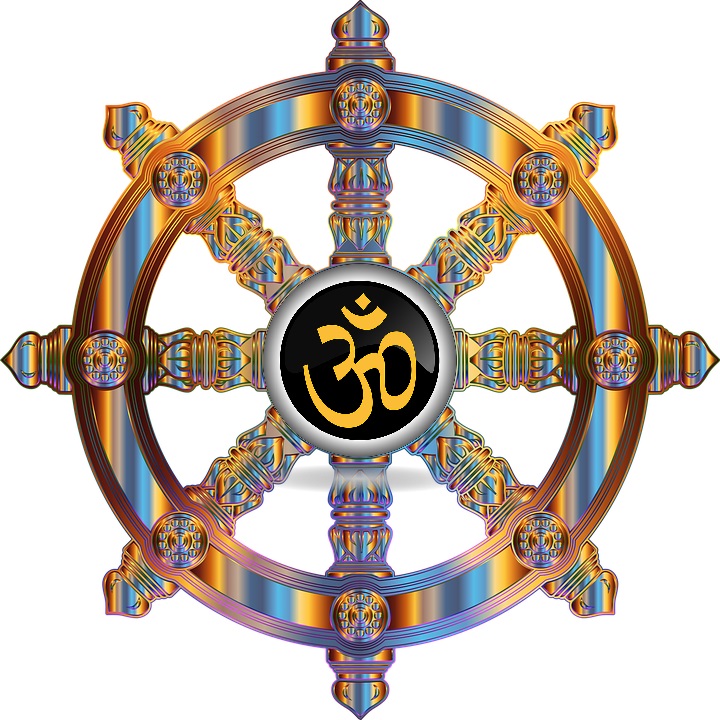The Eightfold Path:

The Eightfold Path was conceived by the Buddha as a way to end the endless cycle of rebirth, and bring an end to our suffering.
The Eightfold Path, and The Four Noble Truths are the foundation of Buddhism. The Eightfold Paths as taught by the Buddha are: Siddhartha envisioned both The Four Noble Truths, and The Eightfold Path while seeking enlightenment underneath a Bodhi tree. The first of these categories is Wisdom. The paths of Right Understanding, and Right Intention both fall under the Wisdom category.
Buddha taught his followers that by following the steps set forth in The Eightfold Path anyone could reach the state of Nirvana, and bring an end to suffering. (DUKKHA)
Buddha’s Eightfold Path is symbolized by the eight spoke Dharma Wheel. Each spoke of the Dharma Wheel represents one of the Eightfold Paths. Each path is symbolically attached like spokes on a wheel, and work in conjunction with each other to bring us to a state of enlightenment.
The Eightfold Path is also known as the Middle Path. Buddha learned from his own experience on his path to enlightenment, and tried to convey to his followers that we should seek balance between decadent ambiance, and self-mortification.
The two extremes of a life of wealthy abundance, and an ascetic lifestyle where one gives up everything, letting go of all possessions, and consuming very little food, or water are not the proper paths to Nirvana.
What does Right refer to?
Buddha taught his followers, Right is that which is honorable, true, and morally acceptable.
The Eightfold Paths are divided into three distinctly different categories. Those categories are as follows…
The second category is Morals. The paths of Right Speech, Right Action, and Right Livelihood are all part of the category of Morals.
The third and final category of the Eightfold Paths is Self-discipline Through Meditation. The paths of Right Mindfulness, Right Effort, and Right Concentration all fall under this final category.
Buddha’s Eightfold Path’s were not meant to be followed in any order, but should all be practiced at the same time in unison with each other.

The path of Right Understanding: (Samma Ditthi)
This challenging step upon the path of Right Understanding, also known as Right View, brings us to the conclusion that we must observe our surroundings, and accept circumstances and events around us for what they truly are, and not for what we believe they should be.
Right Understanding includes Karma, and reincarnation. It involves accepting that there are Karmic consequences for all of our thoughts and deeds both good, and bad. This Karmic debt must be accounted for, and it will affect our future in our current lifetime, and in our next lifetime through reincarnation as well.
Right Understanding will bring about favorable rebirths for our next lifetime, eventually leading us to the end of reincarnation and suffering, as we Embrace Nirvana.
The path of Right Thought: (Samma Sankappa)
Our thoughts and beliefs guide our future. What we focus on, and think about most creates our reality. Our actions create our future through karma.
Our thoughts must emanate from a pure and loving mindset, and must be positive and uplifting in nature. Positive thoughts will guide us to a more satisfying and compassionate life. While negative thoughts, and attachment will only bring us suffering.
Our thoughts about others must be positive as well. Nobody is perfect, but there is something positive to focus on about almost everyone. For those you encounter who are truly cruel, and have no compassion for others, do not waste your negative thoughts on them. The best decision you can make is to ignore them, and let them go from your thoughts.
The path of Right Thought is also called Right Intention.
Buddha taught that Right Intention can be broken down into three parts.
- The Intention of harmlessness. Do no harm to others.
- The Intention of Good Will. Your thoughts and actions must be positive.
- The Intention of Renunciation. The act of letting go of attachments.
The path of Right Action: (Samma Kammanta)
Right Action refers to performing our daily tasks in a manner which is helpful to others. Our intentions as well as our actions matter. We must have good intentions behind our actions, and never use deceit, or manipulate others with our actions.
Right Action means following the steps outlined in the Five Precepts which are…
- Abstain from taking the life of a living being.
- Abstain from taking that which is not freely given to you.
- Abstain from sexual misconduct.
- Abstain from intoxicants that impair your judgement.
- Abstain from false, and slanderous speech is the fifth precept, but that of course belongs under the next path. The Path of Right speech.
The path of Right Speech: (Samma Vaca)
Before you speak, is it necessary, is it true, is it kind. ~Buddha
Right Speech is refraining from vindictively making false statements, or using our words in a way that is harmful to others. Speech that is offensive, cruel, and harmful to others must be avoided.
We must abstain from dishonest, malicious, disrespectful, and abusive language when dealing with others. We must speak gently, and compassionately to those we encounter. Our thoughts which play a big factor in the words we choose to speak must be kind and honest.
If one has nothing positive to say, than silence is always the best answer. Our words must always be beneficial to others. We must never engage in idle chatter, and hurtful speech about others.
The path of Right Livelihood: (Samma Ajiva)
Right Livelihood is earning your living in such a way that is helpful to others, and makes a positive difference in their lives. Service to others is an essential component of Right Livelihood.
We must abstain from earning money in ways that may cause harm to others. This includes animal slaughter, human trafficking, selling weapons, and selling drugs and alcohol.
The path of Right Effort: (Samma Vayama)
Right Effort starts with mindfulness. Our thoughts must be pure, clear and compassionate. It is our thoughts that are the prerequisite of everything else in our lives. Our thoughts control our speech, decisions, and all of our actions.
Right Effort is putting it all together, and using our will to prevent negative thoughts, actions, and speech from arising within us. Through Right Effort we can let go of negative energy, and focus our thoughts and intentions on that which is good.
The path of Right Mindfulness: (Samma Sati)
Right Mindfulness means being aware of what you are doing in the present moment. Right now is all that we have. The past cannot be changed, it is already gone. Continuing to focus on the past leads to suffering. We must accept our current situation for what it is, that is, the results of our past decisions.
Our thoughts and actions in the past determine our reality in the present. We must be mindful of our thoughts and actions in the present, as they will inescapably determine our future.
We must let go of our past, especially our unpleasant and negative experiences. We should be mindful of the lessons that our past mistakes have taught us, but we must never live in our past. Let the past go. Do not let your past mistakes ruin the present moment in your life.
Use meditation to focus your attention, and concentrate on the present moment.
The path of Right Concentration: (Samma Samadhi)
Right Concentration involves training our minds to focus on that which matters most, and letting go of that which binds us to physical reality. The path of right concentration is concentrating all of our attention on all of the things that bring us closer to Nirvana.
Right Concentration involves detachment which releases us from suffering.
Before we can Embrace Nirvana we must let go of the pleasures of the physical world, and let go of all of our attachments to physical reality.
Popular Posts:
Awareness Quotes - 31 Awareness quotes to bring our attention to the present.Love Quotes - 61 Love Quotes to melt the heart of the one you love.
What are Samskaras?
Who is Controlling Your Awareness?
The Four Noble Truths
The Five Precepts
The Ten Fetters
The Importance of Mindfulness
The Monkey Mind:
Enlightened T-Shirts
Recommended Reading:


Embracing Nirvana is a participant in the Amazon Services LLC Associates Program, an affiliate advertising program designed to provide a means for sites to earn advertising fees by advertising and linking to Amazon.com.
All links on this site are subject to being sponsored content for which we will receive financial compensation.

